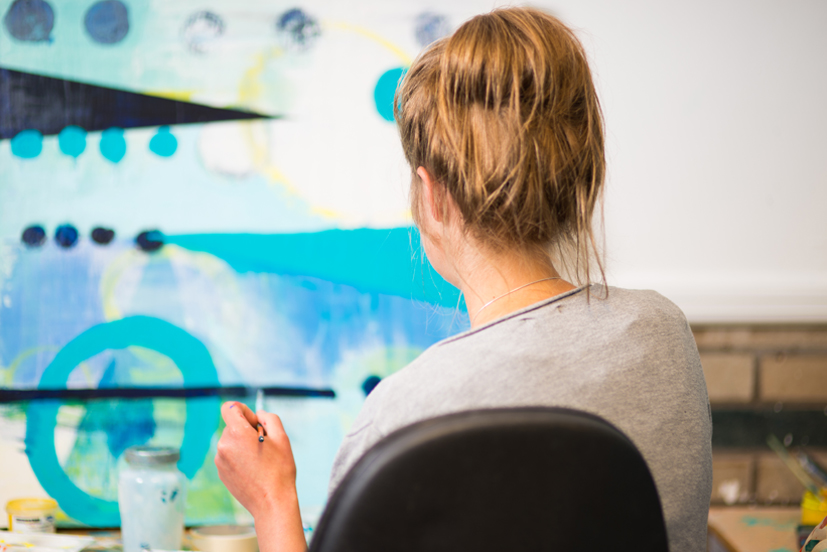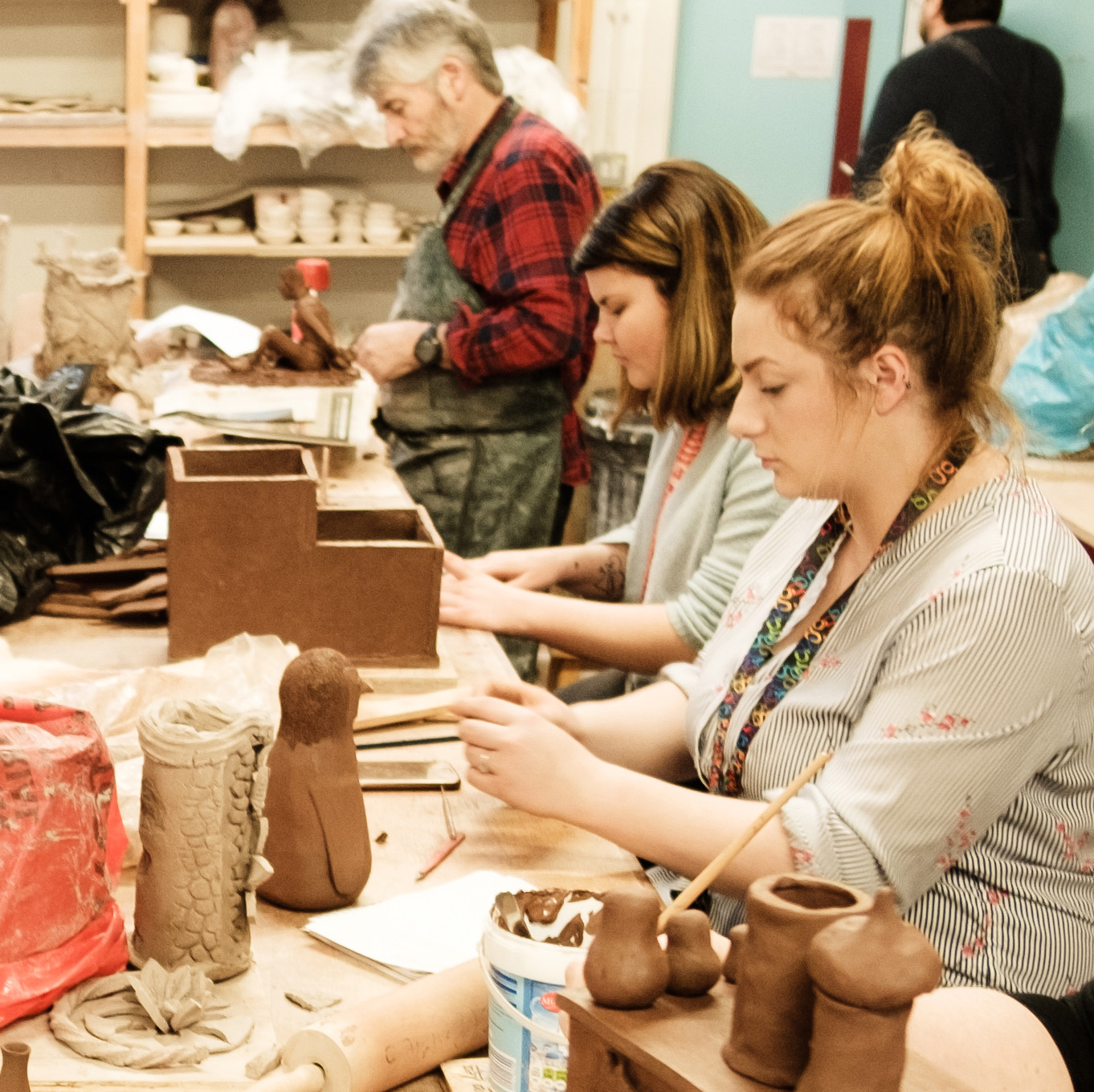BA (Hons) Fine Art (with Foundation Year)

Course details
UCAS Code
W100
Year of entry
2024, 2025
Duration
4 YRS (FT)
UCAS Tariff
48-72
Institution Code
G53
Location
Wrexham
Course Highlights
High-quality
studio space in a traditional art school setting
Strong links
with galleries and exhibition spaces
Choose
your own direction as you develop your practice
Why choose? this course?
Explore drawing, painting, sculpture, installation, video and lens-based media and printmaking, and then take the opportunity to specialise, combine areas or to remain broad-based with this open, creative degree.
You will:
- be able to develop as a creative independent artist with opportunities to take on commissions, showcase your work in exhibitions and enter competitions.
- develop your own unique visual art practice and learn how to creatively use skills and choose materials to express your ideas
- enjoy professional studio space set within a traditional Art School environment, allowing you to test out ideas through making
- study in small groups allowing for individual support
- benefit from strong links with a range of galleries and other exhibition spaces in Wales and the rest of the UK
- have opportunities to study abroad or take part in projects with an international dimension
- be encouraged to exhibit your work
- gain knowledge from high profile visiting artists

Art and Designat Wrexham University
Key course features
- Includes a foundation year to prepare you for further study
- We have vibrant studio spaces set within a traditional Art School environment, allowing students to test out ideas through making.
- Small group sizes allow for individual support.
- Our experienced tutors are passionate about their subjects and regularly produce and exhibit their own work, both nationally and internationally, as well as writing about art practice in books and journals.
- We have strong links with a range of galleries and other exhibition spaces in Wales and the rest of the UK.
- Opportunities to study abroad or take part in projects with an international dimension.
- Be part of an end of year degree show exhibition - view the 2022 Degree Show e-magazine, Unjammed.
- Students are encouraged to exhibit their work and to gain knowledge from high-profile visiting artists.
What you will study
YEAR 1 (FOUNDATION YEAR)
YEAR 2 (LEVEL 4)
Level 4 of the programme provides a broad base exposing you to diverse learning approaches and art media. The focus is on building core technical skills, conceptual development, contextual grounding, communication abilities and independent practice. This foundation equips students with both practical dexterity and critical thinking to progress in their degree.
MODULES
- Introduction to Fine Art Practice
- The Expanded Studio
- Developing Your Artistic Identity 1
- Contexts 1
YEAR 3 (LEVEL 5)
In this year, the modules will advance your contextual grounding, critical reflection abilities, risk-taking, and communication aptitude. The focus is on evolving a personal visual language and situating practice professionally via public participation.
MODULES
- Situating Fine Art Practice
- Developing Fine Art Practice
- Developing Your Artistic Identity 2
- Contexts 2
YEAR 4 (LEVEL 6)
The final year modules stress self-directed explorations culminating in resolved bodies of work, writing to articulate insights, and situating practice professionally via promotions and networks. There is an emphasis on sustaining creative trajectories beyond graduation.
MODULES
- Fine Art Practice as Research
- Presenting Practice to Audience
The information listed in this section is an overview of the academic content of the programme that will take the form of either core or option modules. Modules are designated as core or option in accordance with professional body requirements and internal academic framework review, so may be subject to change.
Entry requirements & applying
Our general requirement for the foundation year is 48-72 UCAS tariff points but all applications are considered individually and we consider work experience, vocational training/qualifications, as well as motivation and potential to succeed.
The Fine Art programme team welcomes applications from anyone who can demonstrate a commitment to the subject and the potential to complete their chosen programme successfully. This can be established by showing appropriate academic achievements or by demonstrating that they possess the knowledge and ability equivalent to the academic qualifications.
An admissions tutor considers each application individually. All candidates will either be individually interviewed or invited to an applicants’ day where they will have the opportunity to display a portfolio of their work.
Experience may also be taken into consideration, particularly for those applicants who do not meet the academic requirements above, depending on the extent and depth of subject knowledge.
Teaching & Assessment
The majority of the work is studio/workshop based and practical in nature supported with lectures, talks by specialist guest speakers, demonstrations, tutorials, seminars and critiques. Assessment is continuous, and there are a series of set and chosen, (both individual and team), assignments in which students learn a range of skills and techniques and apply them creatively to solve art and design problems.
Assessment is designed to enable students to participate in the measurement of their own progress, with clear aims provided from the very beginning of each module, regular feedback and group interaction with critical analysis throughout the course, giving students the opportunities they need to succeed.
Wrexham Glyndŵr University is committed to supporting our students to maximise their academic potential.
We offer workshops and support sessions in areas such as academic writing, effective note-making and preparing for assignments. Students can book appointments with academic skills tutors dedicated to helping deal with the practicalities of university work. Our student support section has more information on the help available.
In terms of particular needs, the University’s Inclusion Services can provide appropriate guidance and support should any students require reasonable adjustments to be made because of a recognised prevailing disability, medical condition, or specific learning difference.
Career prospects
Fine Art, like all of our Art and Design undergraduate programmes, has a strong vocational and academic ethos that aims to ensure graduates acquire a range of vocationally relevant skills. Integral to this ethos is the responsibility to ensure that our graduates have a portfolio of abilities and attributes which will allow them to thrive in the 21st Century workplace. It takes into account the fact that the future needs of the creative industries are likely to be very different and aims to prepare ‘independent learners’ who, on completion of their studies, are able to flourish within increasingly diverse professional contexts.
We pride ourselves on the high level of realistic and practical experience of working in the professional creative environment that you can gain while you are on the programme. Students are encouraged to initiate, organise and participate in off-site projects and engage in professional opportunities, including commercial activities that have the potential to launch their career in Fine Art.
Many Fine Art graduates go on pursue careers in:
- Independent art practice
- Fine art conservation
- Teaching in further or higher education
- Teaching in primary and secondary schools
- Gallery or other forms of exhibition work
- Public or community arts
- Education officers
- Art therapists
- Researchers
- Artist agents
- Technicians
- Arts management
Our Careers & Employability service is there to help you make decisions and plan the next steps towards a bright future. From finding work or further study to working out your interests, skills and aspirations, they can provide you with the expert information, advice and guidance you need.
Fees & funding
You do not have to pay your tuition fees upfront.
The fees you pay and the support available will depend on a number of different factors. Full information can be found on our fees & finance pages. You will also find information about what your fees include in the fee FAQs.
All fees are subject to any changes in government policy, view our undergraduate fees.
Programme specification
Accommodation
If you’re looking for a place to stay while you study then take a look at our accommodation pages to get more information on your options, including our on-campus halls of residence Wrexham Village.
Subject to re-validation
As part of its continuous quality assurance and enhancement, the University reviews its courses on a regular basis to ensure that they reflect the needs of students and employers. Periodic review of the existing programmes is required every five years and major changes may be made to the programmes during the re-validation process. As soon as the programmes are re-validated the details of the course will be confirmed. The majority of courses that are still ‘subject to re-validation’ are approved by the validation process; however, this is not guaranteed and should the course not go ahead as planned, or be significantly amended, you will be informed by the university and assistance will be provided to those who have been offered a place to find a suitable alternative course either at Wrexham University or at another provider.

